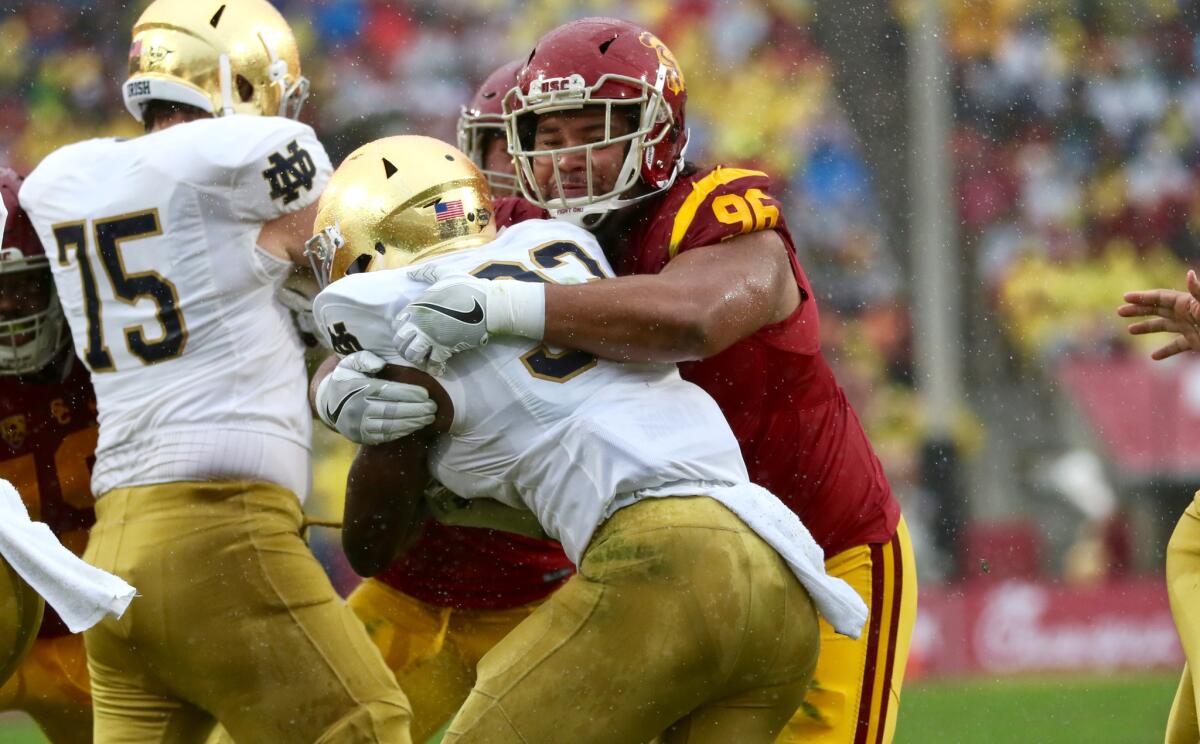USC’s Stevie Tu’ikolovatu (finally) reckons with the end of college, but the NFL beckons

Tu’ikolovatu was the heaviest defensive lineman (331 pounds) at the combine, and his 6-foot-1 frame doesn’t make his body look any better. However, his natural leverage helps him collapse the pocket. Problem is he probably won’t be able to play more than 15 snaps a game right away.
Adoree’ Jackson was still practicing with the track and field team this summer when USC’s defensive tackle transfer, Stevie Tu’ikolovatu, first showed up on campus.
“This guy named Stevie is coming to school,” Jackson said. “So I’m trying to figure out: Who is Stevie?”
He was told that Tu’ikolovatu was a big, strong player of Polynesian descent. But USC had a lot of similar players, and Jackson kept mistaking people for Tu’ikolovatu. One day, he saw another man who sort of fit the description.
“He had on some flip-flops, a hoodie and his hair is up,” Jackson said. “I’m just thinking it’s somebody’s dad just walking around campus.”
It was no dad. It was Tu’ikolovatu, all of 25 years old.
Bowl games can be bittersweet affairs for each team’s seniors, most of whom spend four or five years in college. For Tu’ikolovatu, the nostalgia at the Rose Bowl will be particularly acute. His college career began in 2009; it has spanned the same years as Barack Obama’s presidency.
Until recently, this season’s last game figured to be Tu’ikolovatu’s last in competitive football. He was a backup on Utah’s line last season, not looked at much by scouts. Tu’ikolovatu said he transferred to USC, in part, because he wanted a chance to make the NFL.
No USC player has improved his draft stock more. Tu’ikolovatu, who is listed at 6 feet 1 and 320 pounds, became the anchor of USC’s defense. Coach Clay Helton and defensive line coach Kenechi Udeze have both said they viewed Tu’ikolovatu as an NFL player.
“There is no question,” defensive coordinator Clancy Pendergast, who has coached for six NFL teams, said Thursday. “There are a lot of teams looking for a specific body type to play a certain position inside, and I think he fits that bill, and there’s not a lot of guys available each year in the draft that look like that. So I’m not sure what his prospectus would be. I know I’ll get a lot of calls about it.”
The transfer was a gamble for Tu’ikolovatu, who spent more than a month living in his car with his wife, Kalo, “pretty much homeless,” he said, before he secured housing at USC.
Tu’ikolovatu said Wednesday that he never regretted the decision. He said his nomadic period was “probably the best part since I was here, because my wife and I, we got to learn a lot about ourselves and grow with each other.”
Kalo now wants to move back to Los Angeles after his football career is over, he said. The pair still plan to open facilities to care for the elderly. (Tu’ikolovatu said he would prefer to do so in Hawaii, but marriage is compromise.)
Tu’ikolovatu has begun to hold preliminary talks with agents and will attend the East-West Shrine game after the Rose Bowl in the hopes of boosting his draft stock.
“I just feel like after this year, my opportunity grew and my chances of playing at the next level are greater than it was before,” he said. “And that’s mainly because of the success we’ve had as a team and the reputation that the school has.”
Teammates said they are sad to see him go. Tu’ikolovatu was one reason a young defensive line matured into a strength.
“He’s matured us so much,” linebacker Cameron Smith said. “He was a big help not only to the defensive line, but to the whole defensive unit about how to be a pro, how to study, and how to prepare himself.”
Tu’ikolovatu said he tried to become one of the guys, but because of his age, his teammates usually treated him with a special reverence.
“I don’t know if it’s because I’m older or what,” Tu’ikolovatu said, but teammates would sometimes ask him for advice, such as how he worked through a particular stage in his life. “I had a specific player that came up and asked that he wanted to — he felt too selfish and he was trying to figure out how to change his ways.”
Tu’ikolovatu said he is proud to finish his career in the Rose Bowl. He said he spent time with Kalo over the past few weeks looking at past Rose Bowl highlights online.
“I never thought this day would come, when the time would be done,” Tu’ikolovatu said.
No contest at Beef Bowl
Zach Banner sauntered into the dining room at Lawry’s The Prime Rib on Thursday evening for a Rose Bowl tradition. Every year since 1957, Lawry’s has hosted the two teams in what originally was a prime rib eating competition, the Beef Bowl.
“I’m ready to close this place down,” announced Banner, who 6-9 and listed at 360 pounds.
He smiled. He was joking.
Banner and USC’s other large players said they were actually watching what they ate. The Beef Bowl no longer tracks how much each team consumes to discourage competitive eating. Such overindulgence is frowned upon in this era of increased focus on nutrition.
Richard R. Frank, the president and chief executive of Lawry’s, ended his remarks with a reminder.
“Tonight’s meal is not a competition,” he said. “Save that for Monday.”
Follow Zach Helfand on Twitter @zhelfand
Go beyond the scoreboard
Get the latest on L.A.'s teams in the daily Sports Report newsletter.
You may occasionally receive promotional content from the Los Angeles Times.



